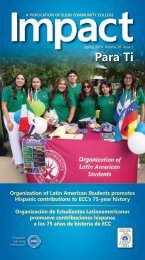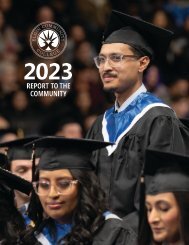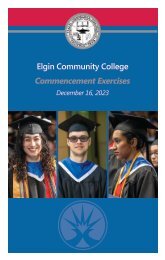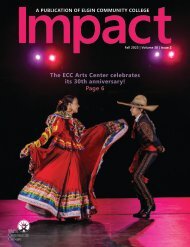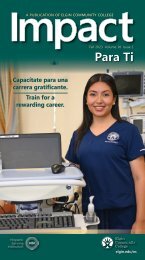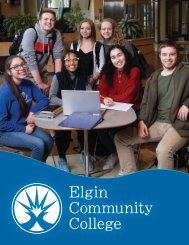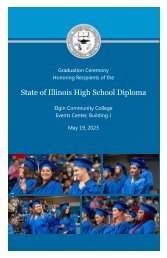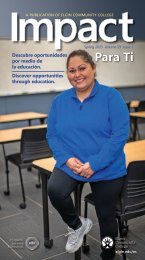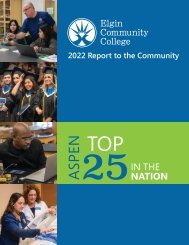ILEA Equity Plan | Elgin Community College (ECC)
There are wide and persistent gaps in college completion rates in Illinois, especially among students of color and low-income students. After an in-depth analysis of our institutional data, Elgin Community College (“ECC” or “the College” or “we” or “our”) has developed an Equity Plan containing annual growth targets for which progress updates will be shared publicly over the next five years. Our Equity Plan reflects the unique characteristics of our institution. For example, ECC is designated as a Hispanic Serving Institution by the US Department of Education, with just over 42% of the students identifying as Latinx or Hispanic. Also, the district served by ECC is widely diverse in terms of income and educational attainment. We will identify the obstacles students face and develop programs and policies that break down unnecessary college graduation barriers. Along with our fellow colleges, in the Partnership for College Completion organization, with this Illinois Equity in Attainment (“ILEA”) plan, we pledge to close the completion gaps by 2025.
There are wide and persistent gaps in college completion rates in Illinois, especially among students of color and low-income students. After an in-depth analysis of our institutional data, Elgin Community College (“ECC” or “the College” or “we” or “our”) has developed an Equity Plan containing annual growth targets for which progress updates will be shared publicly over the next five years. Our Equity Plan reflects the unique characteristics of our institution. For example, ECC is designated as a Hispanic Serving Institution by the US Department of Education, with just over 42% of the students identifying as Latinx or Hispanic. Also, the district served by ECC is widely diverse in terms of income and educational attainment. We will identify the obstacles students face and develop programs and policies that break down unnecessary college graduation barriers. Along with our fellow colleges, in the Partnership for College Completion organization, with this Illinois Equity in Attainment (“ILEA”) plan, we pledge to close the completion gaps by 2025.
You also want an ePaper? Increase the reach of your titles
YUMPU automatically turns print PDFs into web optimized ePapers that Google loves.
Based on the feedback from the fall sessions, a spring series of monthly introductory workshops<br />
is planned and will incorporate any applicable changes. The pilot will be opened up to other<br />
departments who are interested in using the same model. Ultimately, the vision is for this to<br />
become an institutionalized program for all faculty to attend this introductory series and<br />
develop an intermediate level to continue advancing concepts related to culturally responsive<br />
classrooms for those who completed the introduction workshops. Students should start to feel<br />
as though their course materials and classrooms reflect who they are and the faculty they<br />
encounter are inclusive. Research indicates that students truly benefit from inclusive<br />
classrooms and culturally responsive instruction. “A pedagogy that empowers students<br />
intellectually, socially, emotionally, and politically by using cultural referents to impart<br />
knowledge, skills, and attitudes” is the definition of culturally responsive instruction as defined<br />
by Dr. Gloria Ladson-Billings in her book The Dreamkeepers (1994). Students thrive in the<br />
classrooms of teachers who have high expectations for students from all cultural backgrounds,<br />
use a variety of resources, promote positive social and academic development, and collaborate<br />
with colleagues and parents (Krasnoff, 2016).<br />
Additionally, in 2020-2021, the focus will include training TIDE members and other faculty and<br />
administrators in <strong>Equity</strong> Coaching to be equipped to support other faculty in designing and<br />
facilitating equitable courses and classrooms. The intention is to create a sustainable model of<br />
faulty support related to equity and culturally responsive teaching practices. The certification<br />
program will be based on a series of workshops facilitated by NAPE (National Association for<br />
Partnerships in <strong>Equity</strong>).<br />
The TIDE program strategy is connected to other institutional efforts and supports <strong>ECC</strong>’s<br />
strategies in our 2018-2022 Strategic <strong>Plan</strong>. See Table 9 for specific strategies that are aligned.<br />
The Success Indicators used to demonstrate this strategy is having an impact are:<br />
• Student completion of course and programs<br />
• Student progression through coursework<br />
• Student engagement and satisfaction with college programs and services<br />
• Employee mastery of professional development goals<br />
• Effectiveness and efficiency of institutional processes<br />
• Employee awareness and understanding of institutional processes<br />
44<br />
<strong>ILEA</strong> <strong>Equity</strong> <strong>Plan</strong><br />
Institutional Strategies







